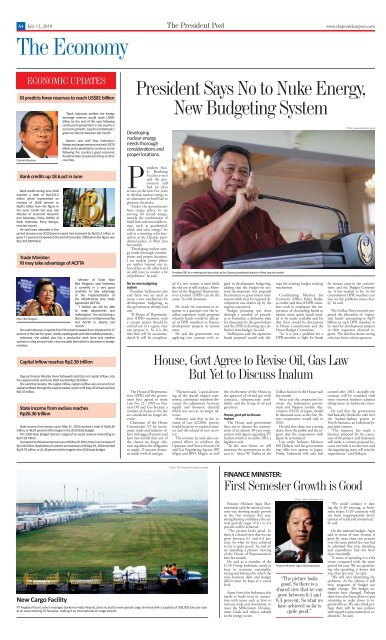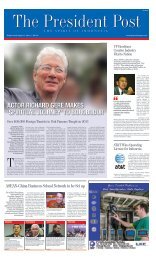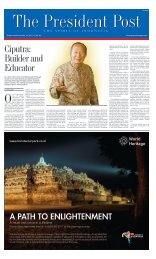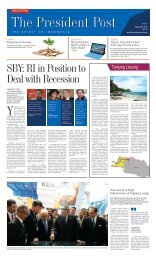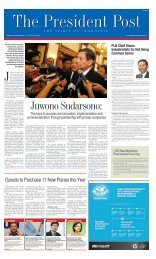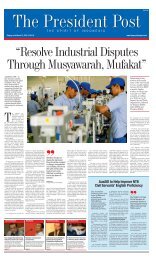Mari Pangestu: The Champion of Free Trade - The President Post
Mari Pangestu: The Champion of Free Trade - The President Post
Mari Pangestu: The Champion of Free Trade - The President Post
You also want an ePaper? Increase the reach of your titles
YUMPU automatically turns print PDFs into web optimized ePapers that Google loves.
A4<br />
July 12, 2010<br />
<strong>The</strong> <strong>President</strong> <strong>Post</strong><br />
www.thepresidentpost.com<br />
<strong>The</strong> Economy<br />
BI predicts forex reserves to reach US$81 billion<br />
Darmin Nasution<br />
ECONOMIC UPDATES<br />
“Bank Indonesia predicts the foreign<br />
exchange reserves would reach US$81<br />
billion by the end <strong>of</strong> this year following<br />
continued improvement in the country`s<br />
economic growth,” says the central bank`s<br />
governor Darmin Nasution last month.<br />
Darmin said until May Indonesia`s<br />
foreign exchange reserves reached US$74<br />
billion and is predicted to continue to rise<br />
following the country`s good economic<br />
fundamentals compared to those <strong>of</strong> other<br />
countries.<br />
<strong>President</strong> Says No to Nuke Energy,<br />
New Budgeting System<br />
Developing<br />
nuclear energy<br />
needs thorough<br />
considerations and<br />
proper locations.<br />
Photo: www.presidenri.go.id<br />
Bank credits up 18.6 pct in June<br />
Bank credits during June 2010<br />
reached a total <strong>of</strong> Rp1,531.5<br />
trillion which represented an<br />
increase <strong>of</strong> 18.68 percent or<br />
Rp241 trillion from the figure in<br />
the same month last year, said<br />
Director <strong>of</strong> Economic Research<br />
and Monetary Policy (DKM) <strong>of</strong><br />
Bank Indonesia, Perry Warjiyo,<br />
here last month.<br />
He said loans extended in the<br />
period January-June 2010 (year-on-year) had increased by Rp101.3 trillion or<br />
grew 7.1 percent compared to the end <strong>of</strong> December 2009 when the figure was<br />
Rp1,437.930 trillion.<br />
<strong>Trade</strong> Minister:<br />
RI may take advantage <strong>of</strong> ACFTA<br />
Minister <strong>of</strong> <strong>Trade</strong> <strong>Mari</strong><br />
Elka <strong>Pangestu</strong> said Indonesia<br />
is currently in a very good<br />
condition to take advantage<br />
<strong>of</strong> the implementation <strong>of</strong><br />
the ASEAN-China <strong>Free</strong> <strong>Trade</strong><br />
Agreement (ACFTA).<br />
“I believe we will be able<br />
to make adjustments and<br />
maked gains,” she said during a<br />
<strong>Mari</strong> Elka <strong>Pangestu</strong><br />
discussion on entrepreneurship<br />
and ACFTA in Jakarta last<br />
month.<br />
She said Indonesia`s imports from China had increased from 10 percent to 17<br />
percent in the last five years, mostly capital goods and intermediate products.<br />
Indonesia, she added, also has a productive work force and creative<br />
workers in a big amount with a low movable level which is attractive to foreign<br />
investors.<br />
<strong>President</strong> Susilo<br />
Bambang<br />
Yud hoyono<br />
said the government<br />
still<br />
had no plan<br />
at least in the next five years<br />
to develop nuclear energy as<br />
an alternative to fossil fuel to<br />
generate electricity.<br />
“Under the government`s<br />
basic energy policy, we are<br />
striving for mixed energy,<br />
namely the combination <strong>of</strong><br />
fossil fuel and renewable energy,<br />
such as geothermal,<br />
wind, and solar energy,” he<br />
said at a meeting with journalists<br />
at the Cipanas presidential<br />
palace in West Java<br />
last month.<br />
“Developing nuclear energy<br />
needs thorough considerations<br />
and proper locations.<br />
I say nuclear power plants<br />
are neither banned nor tabooed<br />
but on the other hand<br />
we still have to resolve a lot<br />
<strong>of</strong> problems,” he said.<br />
No to new budgeting<br />
system<br />
<strong>President</strong> Yudhoyono also<br />
said there was no need to<br />
create a new mechanism for<br />
development budgeting as<br />
the government already had<br />
one.<br />
“If House <strong>of</strong> Representatives<br />
(DPR) members wish<br />
a certain project should be<br />
carried out in a region, they<br />
can propose it. So it is the<br />
idea that will be accommodated.<br />
It will be complicat-<br />
<strong>President</strong> SBY at a meeting with journalists at the Cipanas presidential palace in West Java last month.<br />
ed if a new system is used while<br />
the old one is still in place. Members<br />
<strong>of</strong> the Regional Representatives<br />
Council (DPD) can do the<br />
same,” he told newsmen.<br />
He made the statement in response<br />
to a question over the socalled<br />
aspiration funds proposal<br />
whereby funds would be allocated<br />
to DPR members to finance<br />
development projects in remote<br />
areas.<br />
He said the government was<br />
applying two systems with regard<br />
to development budgeting,<br />
adding that the budget for sectoral<br />
development was prepared<br />
by ministers or government institutions<br />
while that for regional development<br />
was drawn up by the<br />
regions concerned.<br />
Budget planning was done<br />
through a number <strong>of</strong> processes<br />
to formulate a definitive plan<br />
for discussion by the government<br />
and the DPR in drawing up a definitive<br />
state budget, he said.<br />
Yudhoyono said the aspiration<br />
funds proposal would only dis-<br />
rupt the existing budget making<br />
mechanism.<br />
Coordinating Minister for<br />
Economic Affairs Hatta Radjasa<br />
earlier said that if DPR members<br />
wish to emphasize the importance<br />
<strong>of</strong> channeling funds to<br />
remote areas, quick funds needed<br />
to be made available and for<br />
that there would be discussions<br />
in House Commissions and the<br />
House Budget Committee.<br />
“So it is not a problem for a<br />
DPR member to fight for funds<br />
for remote areas in the commissions<br />
and the Budget Committee.<br />
It has worked so far. In the<br />
commissions DPR members can<br />
also see the problems more clearly,”<br />
he said.<br />
<strong>The</strong> Golkar Party recently proposed<br />
the allocation <strong>of</strong> “aspiration<br />
funds” amounting to Rp15<br />
billion to each DPR member to<br />
be used for development projects<br />
in their respective electoral regions.<br />
<strong>The</strong> idea has drawn strong<br />
criticism from various quarters.<br />
Capital inflow reaches Rp2.36 trillion<br />
Deputy Finance Minister Anny Ratnawati said that net capital inflows into<br />
the capital market until June 2010 reached Rp2.36 trillion.<br />
She said that besides the capital inflow, capital outflow also occurred (net<br />
capital outflow) through the capital market, which until May 2010 had reached<br />
Rp1.65 trillion.<br />
State income from excises reaches<br />
Rp26.36 trillion<br />
State income from excises up to May 31, 2010 reached a total <strong>of</strong> Rp26.36<br />
trillion, or 46.01 percent <strong>of</strong> the target in the 2010 State Budget.<br />
<strong>The</strong> 2010 State Budget had set a target <strong>of</strong> an excise revenue amounting to<br />
Rp57.29 trillion.<br />
Compared to the excise tax revenue until May 19, 2010, there is an increase <strong>of</strong><br />
Rp2.66 trillion. Realization <strong>of</strong> customs tax revenues until May 19, 2010 reached<br />
Rp23.70 trillion, or 41.38 percent <strong>of</strong> the target in the 2010 state budget.<br />
<strong>The</strong> House <strong>of</strong> Representatives<br />
(DPR) and the government<br />
have agreed to revise<br />
Law No. 22 / 2001 on Natural<br />
Oil and Gas because a<br />
number <strong>of</strong> clauses in the law<br />
are considered no longer relevant.<br />
Chairman <strong>of</strong> the House<br />
Commission VI for investment,<br />
trade and industry affairs<br />
Airlangga Hartarto said<br />
here last month that one <strong>of</strong><br />
the clauses no longer relevant<br />
stipulates the obligation<br />
to supply 25 percent domestic<br />
needs with oil and gas.<br />
House, Govt Agree to Revise Oil, Gas Law<br />
But Yet to Discuss Inalum<br />
“Hartarto said, “a special meeting<br />
<strong>of</strong> the special inquiry committee,<br />
committee members discussed<br />
the adjustment between<br />
supply and domestic demand<br />
which was seen as no longer relevant.<br />
Hartarto said that in the revision<br />
<strong>of</strong> Law 22/2001, priority<br />
would be given to national interest<br />
and the refund <strong>of</strong> cost recovery<br />
Ṫhe revision, he said, also concerned<br />
efforts to reinforce the<br />
Upstream and Down Stream Oil<br />
and Gas Regulating Agency (BP<br />
Migas and BPH Migas), as well<br />
the involvement <strong>of</strong> the House in<br />
the approval <strong>of</strong> oil and gas work<br />
contracts, infrastructure availability<br />
and the fixing <strong>of</strong> oil and<br />
gas prices.<br />
House, govt yet to discuss<br />
Inalum<br />
<strong>The</strong> House and government<br />
have yet to discuss the continuation<br />
<strong>of</strong> its almost 30-year cooperation<br />
with Japan regarding PT<br />
Inalum which is to end in 2013, a<br />
legislator said.<br />
“In the near future we will<br />
summon the government to discuss<br />
it,” Satya W. Yudha <strong>of</strong> the<br />
Golkar faction in the House said<br />
last month.<br />
Satya said the cooperation between<br />
the Indonesian government<br />
and Nippon Asahan Aluminium<br />
(NAA) <strong>of</strong> Japan should<br />
be discussed soon, as the first 30-<br />
year cooperation would end in<br />
2013.<br />
He said that there was a strong<br />
desire from the public and the regions<br />
that the cooperation with<br />
Japan be terminated.<br />
Last week, Industry Minister<br />
MS Hidayat said the government<br />
may <strong>of</strong>fer two options to Japan.<br />
Firstly, Indonesia will take full<br />
control after 2013, secondly the<br />
contract will be extended with<br />
some renewed business schemes<br />
siding more on Indonesia`s interest<br />
Ḣe said that the government<br />
had basically decided to take over<br />
the Asahan-Inalum project in<br />
North Sumatra, an Indonesia-Japan<br />
joint venture.<br />
“<strong>The</strong> Japanese has made a<br />
business proposal for the extension<br />
<strong>of</strong> the project, and Indonesia<br />
will make a counter proposal because<br />
our wish is to take over, and<br />
the negotiating team will join the<br />
negotiations,” said Hidayat.<br />
Photo: <strong>The</strong> <strong>President</strong> <strong>Post</strong>/Nandi Nanti<br />
FINANCE MINISTER:<br />
First Semester Growth is Good<br />
New Cargo Facility<br />
PT Angkasa Pura II, which manages Soekarno-Hatta Airport, plans to build a new special cargo terminal with a capacity <strong>of</strong> 300,000 tons per year<br />
at an area covering 70 hectares, making it an international air cargo airport.<br />
Finance Minister Agus Martowardojo<br />
said the national economy<br />
was showing steady growth<br />
in the first semester this year,<br />
strengthening confidence the annual<br />
growth target <strong>of</strong> 6.1 to 6.4<br />
percent will be achieved.<br />
“<strong>The</strong> picture looks good. So<br />
there is a shared view that we can<br />
grow between 6.1 and 6.4 percent.<br />
So what we have achieved<br />
so far is quite good,” he said after<br />
attending a plenary meeting<br />
<strong>of</strong> the House <strong>of</strong> Representatives<br />
here last month.<br />
He said as a member <strong>of</strong> the<br />
G-20 Group Indonesia needs to<br />
keep its economy sustainable,<br />
strong and balanced in which the<br />
ratio between debt and budget<br />
deficit must be kept at a sound<br />
level.<br />
Apart from that Indonesia also<br />
needs to build trust in connection<br />
with issues such as how to<br />
increase trade and investment, to<br />
meet the Millennium Development<br />
Goals and reduce subsidy<br />
in the energy sector.<br />
Photo: www.matanews.com<br />
Finance Minister Agus Martowardojo<br />
“<strong>The</strong> picture looks<br />
good. So there is a<br />
shared view that we can<br />
grow between 6.1 and<br />
6.4 percent. So what we<br />
have achieved so far is<br />
quite good.”<br />
“We could conduct it during<br />
the G-20 meeting, as Indonesia<br />
hopes G-20 countries will<br />
not limit inappropriately development<br />
<strong>of</strong> trade and investment,”<br />
he said.<br />
On the national budget, Agus<br />
said in terms <strong>of</strong> state revenue it<br />
grew by more than two percent<br />
over the same period last year but<br />
he admitted that state spending<br />
and expenditure had not been<br />
done maximally.<br />
“It terms <strong>of</strong> spending it is a bit<br />
worse compared with the same<br />
period last year. We are questioning<br />
why spending is slower this<br />
year than last year,” he said.<br />
“We will start identifying the<br />
problems. As the cabinet is still<br />
new, programs <strong>of</strong> budget use<br />
might change. <strong>The</strong> budget authorities<br />
have changed. Perhaps<br />
there have also been efforts to put<br />
ministries in order down to regional<br />
<strong>of</strong>fices. We also think perhaps<br />
there will be new policies<br />
with regard to procurement or realization,”<br />
he said.


